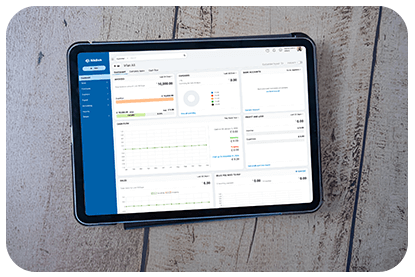19 April 2024
What is the Best Accounting Software for Small Business?
Owners of small businesses have several hats, and accountants are not always one of them. The manual accounting with a spreadsheet or paper leaders is subject to errors and subjected to errors. Best Accounting software automates these functions, tracks revenues and expenses, generates reports and ensures compliance with the tax laws with minimal efforts. Whether you are a freelancer, a dealer or a service provider, the right tools can save you for an hour and headache, from which it should invest from.
Many types of solutions are provided in the market, such as free platforms such as Quicroz books for free software such as waves. Each has its own strength, depending on the size, budget and complexity of the business.
Why Small Businesses Need Best Accounting Software
Owners of small businesses have several hats, and accountants are not always one of them. The manual accounting with a spreadsheet or paper leaders is subject to errors and subjected to errors.
Accounting software automates these functions, tracks revenues and expenses, generates reports and ensures compliance with the tax laws with minimal efforts. Whether you are a freelancer, a dealer or a service provider, the right tools can save you for an hour and headache, from which it should invest from.
The market offers a range of solutions, from robust platforms like QuickZeros Books to free software like Wave. Each has its strengths, depending on your business size, budget, and complexity.
Top 5 Best Accounting Software for small business
1. QuickBooks Online: The Industry Leader
QuickBooks Online, developed by Intuit, is often hailed as the gold standard in accounting software. With a market share hovering around 37.75% (as noted in posts on X in 2025), it’s a favorite among small to medium-sized businesses for its comprehensive features and scalability.
- Key Features: Automated transaction tracking, invoicing with payment integration (PayPal, Venmo, etc.), bank reconciliation, payroll add-ons, and detailed financial reporting (profit & loss, balance sheets).
- Pros: User-friendly interface, extensive third-party integrations (over 700 apps), and excellent customer support with guided setup.
- Cons: Pricing starts at $35/month and can climb to $235/month for advanced plans, which might be steep for solo entrepreneurs.
- Best For: Growing businesses needing a scalable solution with expert support.
QuickBooks shines for its all-in-one approach. If you’re a freelancer who might expand into a small team or a retailer tracking inventory, its flexibility makes it a top contender for the best accounting software for small business.
2. Xero: The Collaborative Choice
Xero is another heavyweight in the accounting software arena, known for its clean interface and unlimited user access a rarity among competitors. It’s particularly popular with businesses that value collaboration and detailed reporting.
- Key Features: Optimized dashboards, payment of bills, invoices, bank cohesion and more than 1000 third -party integration.
- Pros: Reasonable entry plan ($ 15/month, often except), unlimited user and 24/7 support via e -post and chat.
- Cons: Limited inventory tracking compared to QuickBooks, and payroll requires a Gusto add-on.
- Best For: Multi-partner LLCs, freelancers, or small businesses with multiple stakeholders.
Xero’s low starting price and collaborative features make it a strong candidate for the best accounting software. It’s ideal if you want a tool that grows with your team without breaking the bank.
3. QuickZeros: The Free Powerhouse
For budget-conscious entrepreneurs, free accounting software like Wave is a game-changer. Owned by H&R Block, Wave offers a robust free tier that covers the basics, with optional paid upgrades for added functionality.
- Key Features: Unlimited invoicing, expense tracking, financial reporting, and receipt scanning (with the $16/month Pro plan).
- Pros: Free Starter plan with no size limitations, intuitive design, and mobile app for on-the-go invoicing.
- Cons: No automatic bank imports in the free version, and payroll costs extra ($20/month + $6/employee).
- Best For: Freelancers, sole proprietors, or startups with tight budgets.
Wave proves you don’t need to spend a dime to get quality accounting software. It’s a top pick for the best accounting software for small business if cost is your primary concern, though growing businesses might eventually need its paid features.
4. Zoho Books: The Budget-Friendly Customizer
Zoho Books, part of the Zoho ecosystem, offers a compelling mix of affordability and customization. With a free plan for businesses under $50K in revenue and paid tiers starting at $10/month, it’s a versatile option for small operations.
- Key Features: Invoicing, expense tracking, bank reconciliation, project accounting, time tracking, and integration with other Zoho apps.
- Pros: Free tier with solid features, scalable plans up to $275/month, and multilingual invoicing.
- Cons: Advanced features like inventory management require higher tiers, and setup can be less intuitive than competitors.
- Best For: Businesses already using Zoho tools or those needing affordable, customizable accounting software.
Zoho Books is a strong contender for the accounting software for small business, especially if you value integration and growth potential on a budget.
5. FreshBooks: The Freelancer’s Friend
FreshBooks is designed with freelancers and service-based businesses in mind, offering a simple, jargon-free experience. It’s less about complex accounting and more about making invoicing and expense tracking effortless.
- Key Features: Customizable invoicing, time tracking, expense management, automated payment reminders, and a mobile app.
- Pros: Easy to use, great for client management, and integrates with tools like PayPal and Gusto.
- Cons: Starts at $21/month, with add-ons (e.g., team members at $11 each) increasing costs; limited reporting depth.
- Best For: Freelancers, consultants, or small service providers.
FreshBooks may not suit businesses with heavy inventory needs, but its simplicity and client-focused features make it a top pick for the best accounting software in its niche.
Comparing the Options: What’s the Best Fit?
Choosing the best accounting software for small business depends on your specific needs. Here’s a quick breakdown:
- Collaboration: Xero’s unlimited users make it ideal for teams, while QuickBooks limits users unless you upgrade.
- Budget: Wave’s free plan is unbeatable for startups, while Zoho Books offers low-cost scalability.
- Growth: QuickBooks and Xero excel for businesses planning to expand, with robust features and integrations.
- Ease of Use: FreshBooks and Wave win for beginners, with intuitive designs that don’t require accounting expertise.
For most small businesses, QuickBooks Online edges out as the best accounting software due to its widespread use, training resources, and comprehensive tools. However, if you’re just starting out, Wave’s free tier or Xero’s affordability might be more appealing.
Free vs. Paid: Is Free Accounting Software Enough?
Free accounting software like Wave, Zoho Books (under $50K revenue), and NCH Express (for up to five employees) can be a lifeline for cash-strapped businesses. They handle essentials like invoicing and expense tracking without upfront costs. However, they often lack advanced features like payroll, detailed reporting, or automatic bank feeds—features that paid options like QuickBooks and Xero deliver seamlessly.
If your business is simple (e.g., a freelancer with few clients), free tools might suffice. But as complexity grows think employees, inventory, or multiple revenue streams investing in paid accounting software becomes worthwhile for accuracy and efficiency
Tips for Choosing the Best Accounting Software
- Assess Your Needs: Do you need invoicing, payroll, or inventory tracking? Prioritize features that match your operations.
- Consider Your Budget: Start with free or low-cost options and upgrade as needed.
- Test It Out: Most platforms offer free trials—use them to ensure the interface feels right.
- Check Integrations: Ensure the software connects with your bank, CRM, or payment tools.
- Plan for Growth: Pick a tool that scales with your business to avoid switching later.
Conclusion
So, what’s the best accounting software for small business? QuickBooks Online takes the crown for its versatility, support, and market dominance perfect for businesses aiming to grow. Xero follows closely with its affordability and team-friendly design, while Wave stands out as the best free accounting software for startups. Zoho Books and FreshBooks round out the list, catering to budget-conscious users and freelancers, respectively.
Ultimately, the right choice hinges on your unique needs. Whether you opt for a free solution or a premium platform, the best accounting software is the one that saves you time, keeps your finances in order, and lets you focus on building your business. Ready to take control of your books? Try one of these top picks today and see the difference for yourself.



